关于实践的重要性英语作文
- 格式:docx
- 大小:37.49 KB
- 文档页数:2
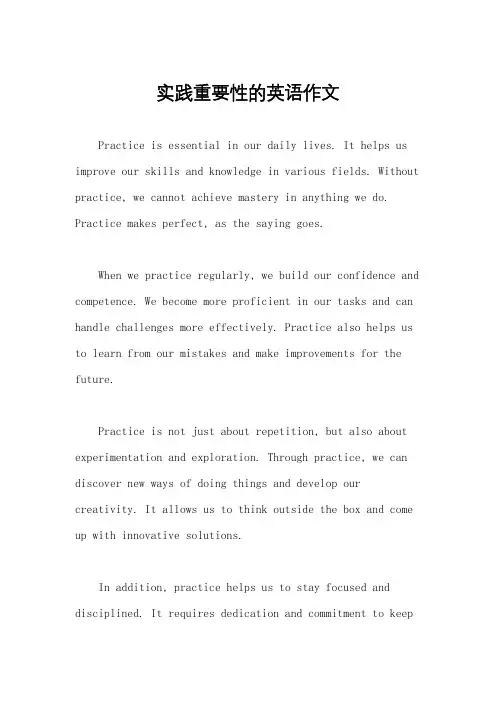
实践重要性的英语作文Practice is essential in our daily lives. It helps us improve our skills and knowledge in various fields. Without practice, we cannot achieve mastery in anything we do. Practice makes perfect, as the saying goes.When we practice regularly, we build our confidence and competence. We become more proficient in our tasks and can handle challenges more effectively. Practice also helps us to learn from our mistakes and make improvements for the future.Practice is not just about repetition, but also about experimentation and exploration. Through practice, we can discover new ways of doing things and develop our creativity. It allows us to think outside the box and come up with innovative solutions.In addition, practice helps us to stay focused and disciplined. It requires dedication and commitment to keeppracticing, even when faced with obstacles or setbacks. By staying consistent in our practice, we can overcome difficulties and achieve our goals.Overall, practice is the key to success in any endeavor. It is through practice that we can reach our full potential and make progress towards our aspirations. So, let's embrace the importance of practice in our lives and striveto practice diligently in everything we do.。

劳动实践课:培养技能与塑造品格Labor Practice Course: Cultivating Skills and Shaping CharacterIn the modern era of educational reform, the importance of practical learning experiences has become increasingly apparent. One such example is the labor practice course, which offers students an opportunity to engage in hands-on activities that complement their theoretical knowledge. This course not only helps students develop practicalskills but also contributes to their personal growth and character development.The labor practice course typically involves a range of activities designed to promote teamwork, responsibility, and discipline. Students are often required to work in groups, completing tasks that require them to communicate effectively, collaborate, and solve problems together. This type of collaborative learning environment fosters a sense of community and cooperation among students, encouraging them to support and learn from each other.One of the key benefits of the labor practice course is the opportunity for students to apply their theoretical knowledge to real-world situations. Through hands-on experience, students gain a deeper understanding of concepts and principles they have learned in the classroom. This practical application of knowledge not only enhances their academic performance but also prepares them forfuture challenges and opportunities.Moreover, the labor practice course helps students develop important life skills such as time management, decision-making, and problem-solving. These skills are crucial for success in both academic and professional settings. By practicing these skills in a safe and structured environment, students are better prepared to handle real-world situations confidently and effectively. In addition to the practical benefits, the labor practice course also plays a significant role in shaping students' characters. Through working hard, taking responsibility, and adhering to deadlines, students learn the value of discipline and hard work. These values areessential for building a strong character and developing a positive attitude towards work and life.Furthermore, the labor practice course encourages students to appreciate the value of labor and contribute to society. By participating in meaningful activities that benefit the community, students gain a sense of fulfillment and purpose. This awareness fosters a sense ofresponsibility towards society and encourages students to become active citizens who contribute positively to their communities.In conclusion, the labor practice course is an integral part of a comprehensive education. It not only equips students with practical skills but also helps them develop important life skills and character traits. By providing students with an opportunity to engage in hands-on activities, the labor practice course contributes to their personal growth and preparation for future challenges. Aswe move towards a more practical and skills-based education, the labor practice course will become increasingly relevant and valuable in shaping the future of our students.**劳动实践课:培养技能与塑造品格**随着教育改革的推进,实践学习体验的重要性日益显现。
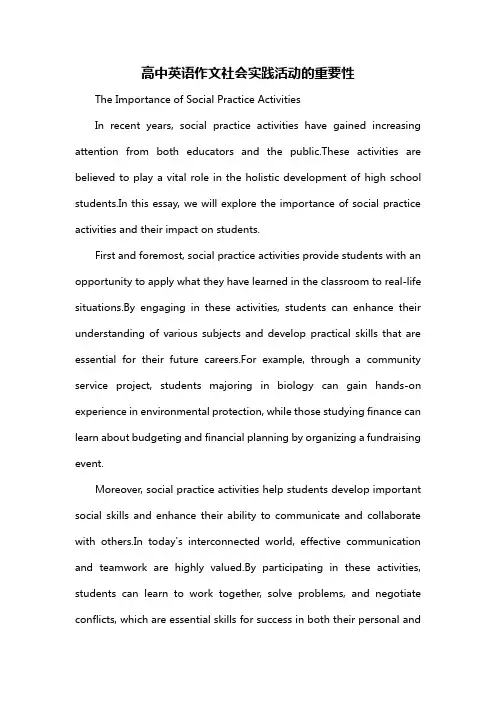
高中英语作文社会实践活动的重要性The Importance of Social Practice ActivitiesIn recent years, social practice activities have gained increasing attention from both educators and the public.These activities are believed to play a vital role in the holistic development of high school students.In this essay, we will explore the importance of social practice activities and their impact on students.First and foremost, social practice activities provide students with an opportunity to apply what they have learned in the classroom to real-life situations.By engaging in these activities, students can enhance their understanding of various subjects and develop practical skills that are essential for their future careers.For example, through a community service project, students majoring in biology can gain hands-on experience in environmental protection, while those studying finance can learn about budgeting and financial planning by organizing a fundraising event.Moreover, social practice activities help students develop important social skills and enhance their ability to communicate and collaborate with others.In today's interconnected world, effective communication and teamwork are highly valued.By participating in these activities, students can learn to work together, solve problems, and negotiate conflicts, which are essential skills for success in both their personal andprofessional lives.Another significant aspect of social practice activities is that they help students broaden their horizons and gain a better understanding of society.These activities allow students to step out of their comfort zones and experience different cultures, lifestyles, and social issues.This exposure helps them become more open-minded, tolerant, and empathetic individuals, qualities that are crucial for active citizenship and social responsibility.Lastly, social practice activities contribute to the physical and mental well-being of students.These activities often involve physical exertion and outdoor experiences, promoting a healthy lifestyle and a appreciation for the natural world.Additionally, the challenges and rewards of these activities can help build students' self-confidence and resilience, enabling them to better cope with future challenges and setbacks.In conclusion, social practice activities are of great importance to high school students.They not only help students apply their knowledge and skills in practical situations but also foster their social development, broaden their horizons, and promote their overall well-being.Therefore, schools and educators should encourage and provide more opportunities for students to engage in these activities, ensuring a well-rounded education that prepares students for success in the real world.。
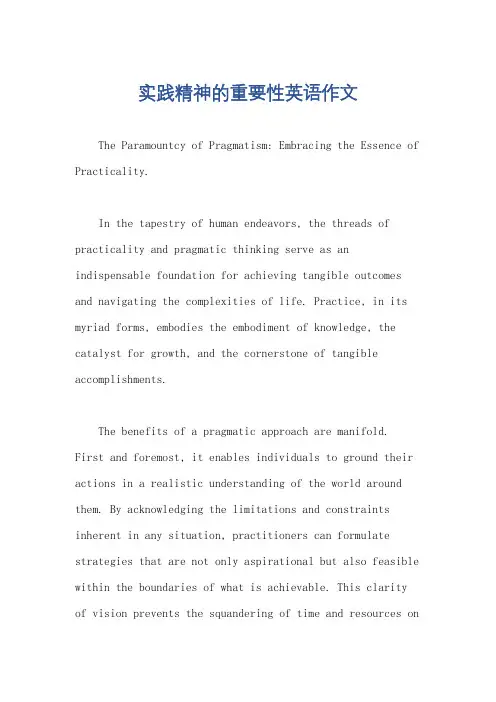
实践精神的重要性英语作文The Paramountcy of Pragmatism: Embracing the Essence of Practicality.In the tapestry of human endeavors, the threads of practicality and pragmatic thinking serve as an indispensable foundation for achieving tangible outcomes and navigating the complexities of life. Practice, in its myriad forms, embodies the embodiment of knowledge, the catalyst for growth, and the cornerstone of tangible accomplishments.The benefits of a pragmatic approach are manifold.First and foremost, it enables individuals to ground their actions in a realistic understanding of the world around them. By acknowledging the limitations and constraints inherent in any situation, practitioners can formulate strategies that are not only aspirational but also feasible within the boundaries of what is achievable. This clarity of vision prevents the squandering of time and resources onunrealistic pursuits and ensures that efforts are directed towards objectives that have a genuine chance of success.Moreover, the act of putting theory into practice provides invaluable experiential learning opportunities. By actively engaging with the practical aspects of a task or endeavor, individuals gain firsthand experience that complements and enriches their theoretical knowledge. This experiential learning process allows for a deeper comprehension of the subject matter, fostering a more nuanced understanding of its intricacies. Through the crucible of practice, individuals discover the strengths and weaknesses of their knowledge, enabling them to refine their approach and identify areas for improvement.Furthermore, practicality promotes innovation and problem-solving. When faced with challenges or obstacles, practitioners are compelled to think creatively and find solutions that are both effective and efficient. This process often leads to the development of novel approaches and innovative solutions that would not have been conceivable from a purely theoretical perspective. Byembracing a pragmatic mindset, individuals empower themselves to become proactive agents of change, capable of overcoming adversity and driving progress.The importance of practicality extends beyond its immediate benefits. In a world characterized by rapid technological advancements and constant change, it is essential to cultivate a workforce that is not only knowledgeable but also adept at adapting to new situations and challenges. Practicality fosters resilience, adaptability, and the ability to embrace lifelong learning, skills that are highly valued in today's dynamic job market.Moreover, practicality promotes accountability and a sense of ownership. By translating theoretical knowledgeinto tangible actions, individuals become directly responsible for the outcomes of their endeavors. This sense of accountability instills a heightened level of motivation and commitment, driving practitioners to perform at their best and strive for excellence.In educational settings, practicality plays a pivotalrole in fostering meaningful learning. By incorporating hands-on experiences, project-based assignments, and real-world applications into the curriculum, educatorsfacilitate a deeper understanding of complex concepts among students. Practical learning allows students to connect theory with practice, fostering critical thinking, problem-solving, and the development of valuable transferable skills.In conclusion, the importance of practicality cannot be overstated. By grounding actions in a realistic understanding of the world, providing invaluable experiential learning opportunities, promoting innovation and problem-solving, cultivating a workforce that is adaptable and accountable, and fostering meaningful learning in educational settings, practicality serves as an indispensable compass guiding individuals towards success and personal fulfillment. Embracing the essence of practicality empowers us to navigate the complexities of life with confidence, resilience, and a deep sense of accomplishment.。
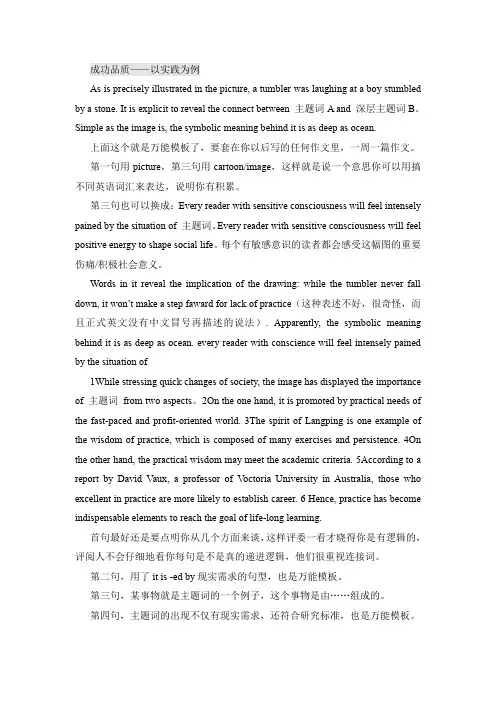
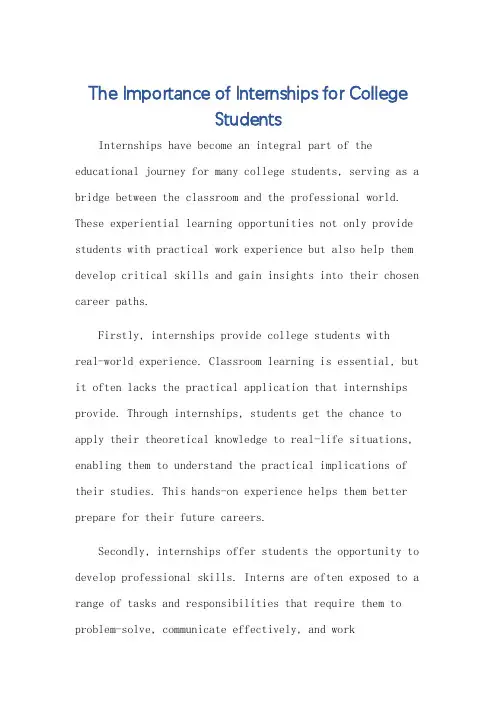
The Importance of Internships for CollegeStudentsInternships have become an integral part of the educational journey for many college students, serving as a bridge between the classroom and the professional world. These experiential learning opportunities not only provide students with practical work experience but also help them develop critical skills and gain insights into their chosen career paths.Firstly, internships provide college students withreal-world experience. Classroom learning is essential, but it often lacks the practical application that internships provide. Through internships, students get the chance to apply their theoretical knowledge to real-life situations, enabling them to understand the practical implications of their studies. This hands-on experience helps them better prepare for their future careers.Secondly, internships offer students the opportunity to develop professional skills. Interns are often exposed to a range of tasks and responsibilities that require them to problem-solve, communicate effectively, and workcollaboratively. These skills are invaluable in any professional setting and are often difficult to learnsolely through classroom instruction.Moreover, internships give students the chance to network and build professional relationships. Internship programs often provide students with access to a network of professionals in their field of study. These connections can lead to future job opportunities, mentorships, or even just valuable advice and insights.Additionally, internships help students gain clarity about their career goals. By working in a professional setting, students can gain a better understanding of their interests, strengths, and weaknesses. This self-awareness can help them make more informed decisions about their future careers and educational paths.Finally, internships can enhance students' resumes and job prospects. Employers often look for candidates with relevant work experience, and internships provide an excellent way for students to acquire this experience. Internships can also lead to job offers, and even if theydon't, they provide students with the opportunity to learn and grow in a professional environment.In conclusion, internships are a crucial part of the college experience. They provide students with practical work experience, help them develop professional skills,build their networks, clarify their career goals, and enhance their job prospects. College students should seize the opportunity to gain meaningful internships to prepare themselves for successful careers.**大学生实习的重要性**实习已成为许多大学生教育旅程中不可或缺的一部分,它架起了课堂与职业世界之间的桥梁。

学校劳动实践英语作文英文回答:School Labor Practice.School labor practice refers to the involvement of students in various forms of work or activities that contribute to the functioning and improvement of their school environment. It encompasses a wide range of responsibilities, from routine maintenance tasks to leadership roles in school organizations.Benefits of School Labor Practice.School labor practice provides numerous benefits to students, the school community, and society as a whole. Some key advantages include:Developing Practical Skills and Work Ethic: Students gain valuable hands-on experience in a range of tasks,fostering their problem-solving abilities, teamwork skills, and sense of accomplishment.Enhancing School Culture and Community Engagement: Students take ownership of their school environment, contributing to its cleanliness, functionality, and aesthetics. This creates a positive and supportive learning atmosphere.Promoting Civic Responsibility: School labor practice instills in students a sense of responsibility towardstheir community. They learn the importance of contributing to the greater good and developing a strong work ethic.Preparing Students for the Workforce: Students develop skills that are highly valued in the job market, such as communication, collaboration, problem-solving, and time management.Reducing School Expenses: By involving students in maintenance and other tasks, schools can save on labor costs and redirect those funds to educational programs.Types of School Labor Practice.Various types of school labor practice exist, including:School Garden Maintenance: Students participate in planting, watering, harvesting, and maintaining a school garden.Classroom Cleaning: Students take responsibility for keeping their classrooms clean and organized.Tutoring and Mentoring: Students assist other students with their studies, providing support and guidance.Library Help: Students help with organizing books, shelving materials, and assisting patrons in finding resources.School Newspaper and Yearbook Production: Students participate in writing, editing, and producing school publications.Custodial Tasks (limited): Under appropriate supervision, students may assist with light cleaning and maintenance duties.Leadership Roles in Student Organizations: Students take on leadership roles in clubs, sports teams, and student government, organizing events, representing their school, and making decisions that affect the student body.Best Practices for School Labor Practice.To ensure that school labor practice is effective and beneficial, it is important to adhere to best practices, such as:Clear Expectations and Supervision: Establishing clear guidelines and expectations for students' roles and responsibilities.Student Choice and Engagement: Allowing students to have input in selecting tasks they participate in,fostering ownership and motivation.Appropriate and Safe Tasks: Assigning tasks that are age-appropriate, safe, and beneficial to students' development.Recognition and Appreciation: Acknowledging and celebrating students' contributions to the school community.Evaluation and Improvement: Regularly assessing the effectiveness of school labor practice and making adjustments as needed.Conclusion.School labor practice is an important aspect of educational development that provides numerous benefits to students, schools, and society. By engaging students in meaningful work and activities, schools can fosterpractical skills, enhance school culture, promote civic responsibility, and prepare students for the workforce. By adhering to best practices, schools can create a positiveand productive learning environment where students can thrive and make a meaningful contribution to their surroundings.中文回答:学校劳动实践。
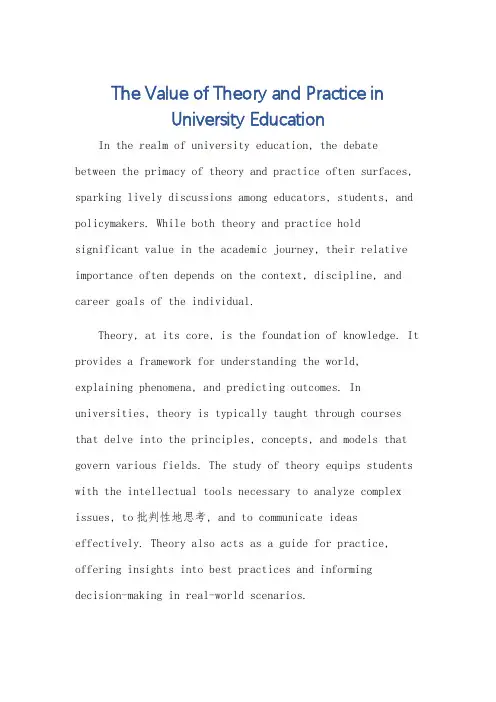
The Value of Theory and Practice inUniversity EducationIn the realm of university education, the debate between the primacy of theory and practice often surfaces, sparking lively discussions among educators, students, and policymakers. While both theory and practice hold significant value in the academic journey, their relative importance often depends on the context, discipline, and career goals of the individual.Theory, at its core, is the foundation of knowledge. It provides a framework for understanding the world, explaining phenomena, and predicting outcomes. In universities, theory is typically taught through courses that delve into the principles, concepts, and models that govern various fields. The study of theory equips students with the intellectual tools necessary to analyze complex issues, to批判性地思考, and to communicate ideas effectively. Theory also acts as a guide for practice, offering insights into best practices and informing decision-making in real-world scenarios.However, the importance of theory cannot be overstated without acknowledging the crucial role of practice. Practice is the application of theory to real-world situations, the testing of ideas in the field. It is the bridge between the abstract world of academic knowledge and the concrete realities of daily life. Through practice, students gain hands-on experience, learn to adapt theory to specific contexts, and develop problem-solving skills that are invaluable in their future careers.The integration of theory and practice in university education is crucial for fostering a comprehensive understanding of subjects and preparing students for the challenges of the real world. A purely theoretical approach can lead to a disconnect between academic knowledge and practical application, while a practice-oriented approach may lack the depth and rigor necessary for a comprehensive understanding of complex issues.The optimal balance between theory and practice depends on the discipline and career goals of the individual. In some fields, such as engineering or medicine, where the application of knowledge to real-world problems isparamount, a heavier emphasis on practice may be necessary. In other fields, such as philosophy or literature, where the analysis and interpretation of theoretical concepts are key, a stronger focus on theory may be appropriate.In conclusion, both theory and practice are integral to university education. Theory provides the intellectual foundation for understanding the world, while practice brings this knowledge to life, allowing students to apply their learning to real-world scenarios. By balancing theory and practice, universities can foster a learning environment that prepares students for the challenges of the future, equips them with the skills necessary for success, and cultivates a culture of continuous learning and innovation.**大学教育中理论与实践的价值**在大学教育中,理论与实践哪个更重要的争论经常浮现,引发教育工作者、学生和决策者之间的热烈讨论。
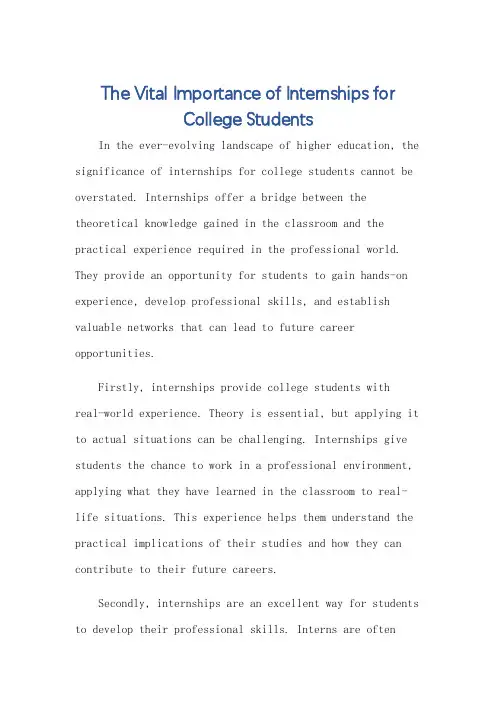
The Vital Importance of Internships forCollege StudentsIn the ever-evolving landscape of higher education, the significance of internships for college students cannot be overstated. Internships offer a bridge between the theoretical knowledge gained in the classroom and the practical experience required in the professional world. They provide an opportunity for students to gain hands-on experience, develop professional skills, and establish valuable networks that can lead to future career opportunities.Firstly, internships provide college students withreal-world experience. Theory is essential, but applying it to actual situations can be challenging. Internships give students the chance to work in a professional environment, applying what they have learned in the classroom to real-life situations. This experience helps them understand the practical implications of their studies and how they can contribute to their future careers.Secondly, internships are an excellent way for students to develop their professional skills. Interns are oftenassigned tasks that require them to use their problem-solving abilities, communication skills, and teamwork. These skills are crucial for success in any profession. By honing these skills during their internship, students are better prepared for the demands of the job market.Moreover, internships provide an excellent networking opportunity. During their internship, students have the chance to meet and work with professionals in their fieldof interest. These connections can lead to valuable mentorships, future job opportunities, or even partnerships. The professional network developed during an internship can be a critical asset throughout a student's career.Additionally, internships can help students identify their career goals and interests. Working in a professional environment can give students a better understanding oftheir strengths, weaknesses, and preferences. This self-awareness can guide them in choosing a career path that aligns with their goals and passions.In conclusion, internships are a crucial component of a college student's educational journey. They provide an opportunity for students to gain real-world experience,develop professional skills, and establish valuable networks. Internships not only enhance a student's resume but also prepare them for the demands of the job market. As the world becomes increasingly competitive, the importanceof internships for college students cannot be overstated.**大学生实习的重要性**在高等教育不断演变的背景下,大学生实习的重要性不言而喻。

实践的重要性英语作文•相关推荐关于实践的重要性英语作文范文(精选8篇)在平凡的学习、工作、生活中,许多人都有过写作文的经历,对作文都不陌生吧,借助作文人们可以反映客观事物、表达思想感情、传递知识信息。
你写作文时总是无从下笔?以下是小编收集整理的关于实践的重要性英语作文范文,仅供参考,大家一起来看看吧。
实践的重要性英语作文篇1参考范文:Nowadays many universities encourage and organize students to take part in social practice activities. During the holidays, more and more students choose to be the volunteers, take part-time jobs, or take part in other practical activities alike. It’s obvious that social practice is playing a more and more important role in China’s college education。
Undoubtedly, college students have benefited a lot from social practice. Above all, they are provided with more opportunities to contact the real world outside the campus. Moreover, in social practice activities, students can apply their knowledge to the solution to the practical problems. So their practical skills are improved greatly. Besides, social practice helps strengthen students’ sense of social responsibility。

【导语】英语作文,是指用英语针对某一内容写出一篇文章;是英语考试最常见的一种题目类型。
英语作文也可以说是整张试卷中最难的板块,因为作文就是对所有知识的综合考察,所以难度大一些。
对于写作能力差的同学来说,可以多看看背范文的运用加以学习。
下面是整理发布的大学四级英语作文:熟能生巧,欢迎阅读参考!更多相关讯息请关注!Practice Makes PerfectThere is an old saying itl China: Practice makes perfect. Practice is a means and perfect is a goal. Only when you do more practice can you make things perfect. This is true not only in our learning but also in other walks of life. Take the study of English for example. Practice enables us to spell words correctly and master the rules of grammar quickly and practice also makes us hecome fluent in speaking and writing. It is ahnost impossible for a person to speak English fluently and accurately without a lot of practice. Another case in point is cooking. A good cook can prepare a delicious meah But you will not be surprised at his performance if you know how much time he has spent practising. Through practice, he then becomes an expert at cooking. It goes without saying that practice makes perfect. Only through practice can one be good at doing things. Since we have realized the importance of practice, why not put it into practice?标题:熟能生巧内容:实践使Perfect1。
实践的重要性英语作文The importance of PracticeAn ancient Chinese proverb says "Knowledge is a treasure, but practice is the key to it", which means it's more than critical to practice.I think that we should attach great importance to practice. There are numerous reasons to answer the importance of practice. To begin with, practice is an only rule to test reality, which means practice is the key to acquire knowledge. What' more, practice makes perfect. If we deliberate practice, we may be got some critical thing that we expect. last but not least, just do it. If you would like to success, you must do it. In order to get this treasure, you must do it.After what we discussed above, we can reasonably come to conclusion that we should understand the importance of practice and just do it.翻译:实践的重要性中国古代谚语说:"知识是财富,实践是打开宝库的钥匙",这意味着实践相当重要。
关于劳动实践的英语作文
英文回答:
Labor practice is an essential part of our daily lives. As a working professional, I have gained valuable experience and skills through my labor practice. For example, when I first started working, I had to learn how to communicate effectively with my colleagues and clients. This was not something I had learned in school, but through actual practice in the workplace. I also learned the importance of time management and prioritizing tasks to meet deadlines. These are skills that have been crucial to my success in my career.
中文回答:
劳动实践是我们日常生活中不可或缺的一部分。
作为一名职业人士,通过我的劳动实践,我获得了宝贵的经验和技能。
例如,当我刚开始工作时,我不得不学会如何与我的同事和客户有效沟通。
这不是我在学校学到的东西,而是通过在工作场所的实际实践。
我
还学会了时间管理的重要性,以及如何优先处理任务以满足截止日期。
这些技能对我在职业生涯中取得成功至关重要。
英语作文中关于劳动实践活动的作文Labor practice is an integral aspect of our educational journey that goes beyond academic learning. It provides a unique opportunity for students to apply theoretical knowledge to real-world situations, fostering a deeper understanding of concepts and their practical applications. Engaging in labor practices not only helps us developskills but also instills values such as responsibility, teamwork, and perseverance.During my recent labor practice experience, I participated in a gardening project at our school. The aim was to create a lush green space where students could relax, study, and appreciate nature. The project required us to plan, plant, and maintain the garden, ensuring its sustainability and beauty.Planning the garden was a challenging task. We had to consider various factors such as the type of plants, their spacing, and the amount of sunlight and water they would require. This process taught us about the importance of planning and preparation in any endeavor. We also learnedabout different plants and their growth cycles, which broadened our horticultural knowledge.The planting phase was physically demanding but rewarding. We dug holes, planted seedlings, and watered the plants regularly. This hands-on experience gave us a senseof accomplishment and responsibility as we saw the plants grow and flourish under our care. It also taught us aboutthe importance of hard work and dedication in achieving goals.Maintaining the garden was an ongoing task thatrequired regular monitoring and care. We had to weed, prune, and fertilize the plants to ensure their healthy growth. This taught us about the importance of continuous effortand attention to detail in maintaining anything worthwhile. It also instilled in us a sense of responsibility towards nature and the environment.Through this labor practice experience, I gained valuable skills such as teamwork, communication, andproblem-solving. I also developed a deeper understanding of the importance of labor and the role it plays in our society. Labor not only produces the goods and services weneed but also instills values such as discipline, responsibility, and perseverance in us.Moreover, labor practice helps us connect with ourroots and appreciate the hard work of our ancestors. It reminds us that everything we enjoy today is a result of someone's hard labor and dedication. It instills in us a sense of gratitude and respect towards those who have contributed to our well-being.In conclusion, labor practice is a crucial aspect ofour educational journey. It complements academic learningby providing practical experiences that help us understand concepts better and develop valuable skills. It alsoinstills values such as responsibility, teamwork, and perseverance in us, making us better-rounded individuals. Engaging in labor practices not only benefits usindividually but also contributes to the overall development and progress of our society.**劳动实践:我们成长的重要部分**劳动实践是我们教育旅程中不可或缺的一部分,它超越了学术学习。
The Essence of Labor Practice: A Fusion ofEast and WestLabor practice, a fundamental aspect of human life, is often overlooked in the fast-paced world of technology and automation. However, its significance cannot be understated, as it is the backbone of societal progress and individual growth. This essay delves into the essence of labor practice, examining its historical context, cultural significance, and modern-day relevance.Historically, labor has been a key driver of societal evolution. From the agricultural revolution to theindustrial age, human labor has been the catalyst for change. It has not only shaped the economy but has also influenced the way we view work, responsibility, and community. The sweat and toil of millions have built the cities, farms, and factories that form the fabric of our world.Cultural perspectives on labor vary widely. In the East, labor is often viewed as a virtuous act, a means ofpersonal growth and societal contribution. The Confucian ideal of "ren," which emphasizes the importance of personaleffort and responsibility, is a testament to this. In contrast, Western cultures have sometimes equated laborwith drudgery and seen it as a necessary evil. However,there is a growing recognition that labor is not just about earning a livelihood but is also a means of self-actualization and community building.Modern-day labor practices are facing significant challenges. With the advent of technology and automation, many fear that the traditional workforce will become obsolete. However, this does not necessarily signify theend of labor. Instead, it represents an opportunity for reimagining labor practices in a way that is more inclusive, sustainable, and respectful of human dignity. Collaborative robots, for example, can augment human labor instead of replacing it, enabling workers to focus on more creativeand fulfilling tasks.Moreover, labor practice is integral to personal growth. It instills discipline, teaches resilience, and fosters a sense of accomplishment. Through labor, individuals learn the value of hard work, dedication, and teamwork. Theseskills and values are not just relevant in the workplacebut also in daily life, helping us build meaningful relationships and contribute positively to society.In conclusion, labor practice is a multifaceted phenomenon that transcends cultural and temporal boundaries. It is a powerful force for societal progress and individual growth. By recognizing the value of labor and investing in sustainable labor practices, we can build a more inclusive, equitable, and prosperous world.**劳动实践的精髓:东西方的融合**劳动实践,作为人类生活的基础方面,常常在科技和自动化的快速世界中被忽视。
学生毕业前进行社会实践英语作文Title: The Significance of Social Practice Before GraduationEngaging in social practice is an indispensable part of the learning journey for students before graduation.It serves as a bridge, linking theoretical knowledge acquired in classrooms to real-world applications.Not only does it provide an opportunity to apply what we have learned, but it also helps in developing our soft skills, such as communication, teamwork, and problem-solving abilities.标题:毕业前社会实践的重要性在毕业前参与社会实践是学生求学旅程中不可或缺的一部分。
它如同桥梁,将我们在课堂上学到的理论知识与实际应用紧密相连。
社会实践活动不仅为我们提供了一个应用所学知识的平台,而且有助于培养我们的软技能,如沟通、团队合作和解决问题的能力。
During my last summer vacation, I participated in a volunteer teaching program in a rural area.This experience was an eye-opener, allowing me to understand the education gap between urban and rural areas.It was a humbling experience to teach and interact with those children, and it reminded me of the importance of contributing to society.在去年暑假,我参加了一个农村地区的志愿教学项目。
实践的重要性英语作文ChatGPT:1. Life's Lessons in Action: Unleashing the Power of Experience。
In the realm of personal growth and understanding, the essence of life lies not just in the words on a page, but in the hands-on lessons we gather through experience. It's a journey where every stumble and triumph becomes a chapter in our story, shaping who we are.2. The Art of Learning by Doing。
Imagine a world where wisdom isn't just a concept, but a tangible skill. The act of putting ideas into practice is the catalyst for real knowledge. It's like a puzzle, each piece a unique encounter that fits snugly into the bigger picture.3. The Unexpected Benefits of Trial and Error。
In the realm of problem-solving, the road less traveled is often the most rewarding. The bumpy roads of practice teach resilience and adaptability. It's not always smooth sailing, but the lessons learned from the rough waters are invaluable.4. Empowerment Through Practice。
关于实践的重要性英语作文
Nowadays many universities encourage and organize
students to take part in social practice activities. During
the holidays, more and more students choose to be the volunteers, take part-time jobs, or take part in other
practical activities alike. It’s ob vious that social
practice is playing a more and more important role in
China’s college education。
Undoubtedly, college students have benefited a lot from social practice. Above all, they are provided with more opportunities to contact the real world outside the campus. Moreover, in social practice activities, students can apply their knowledge to the solution to the practical problems. So their practical skills are improved greatly. Besides, social practice helps strengthen students’ sense of social responsibility。
Considering the above-mentioned, I think, it is necessary for college students to participate in social practice. However, social practice may bring some problems. For example, some students spend too much time in taking part-time jobs so as to ignore their study. Therefore, we should try to balance the relationship between social practice and study。
参考译文:
现在很多大学鼓励和组织学生参加社会实践活动。
在假期里,越来
越多的学生选择做志愿者,兼职工作,或参加其他实践活动。
很明显,社
会实践中发挥着越来越重要的作用,中国的大学教育。
毫无疑问,大学生社会实践受益匪浅。
最重要的是,他们提供了更多的机会接触校园以外的现实世界。
此外,在社会实践活动中,学生能够应用他们所学的知识去解决实际问题。
所以他们的实践技能得到了较大的改善。
此外,社会实践有助于增强学生的社会责任感。
考虑到上述,我认为,有必要对大学生参与社会实践。
不过,社会实践可能带来一些问题。
例如,一些学生花太多时间在兼职工作,忽视了他们的研究。
所以,我们应该试着平衡社会实践和学习之间的关系。